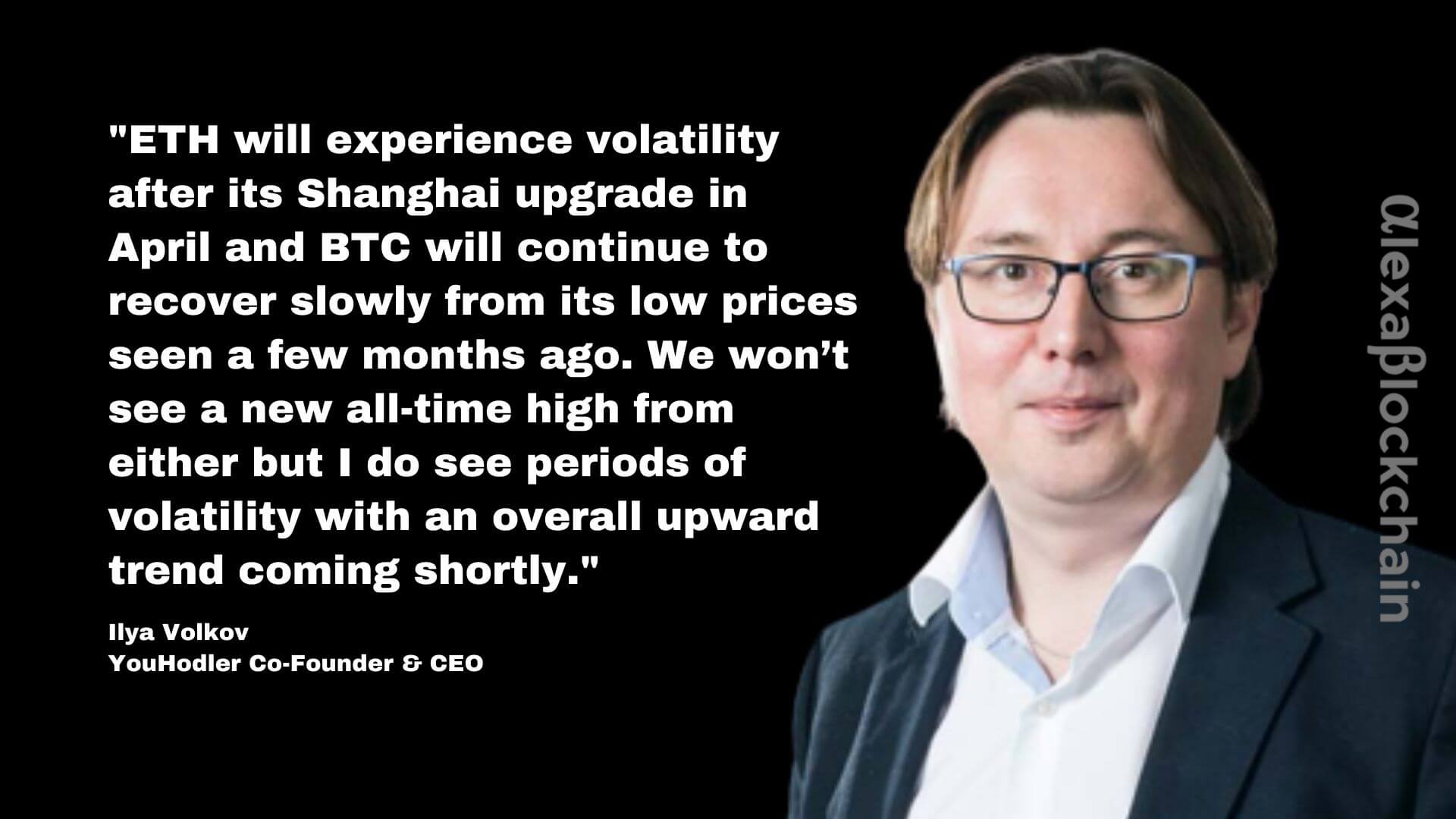
In a recent interview conducted by Arun Shakyawar of AlexaBlockchain, Ilya Volkov, the CEO and Co-Founder of YouHodler, a blockchain-based FinTech platform, shared his insights and predictions for Q2 2023.
As April starts with global market uncertainty (including the rising interest rates), Volkov delves into the impact of the global market on the crypto industry and the challenges that lie ahead. He also discusses the recent banking crisis and its connection to the world of crypto, shedding light on the integral role that both play in the global financial ecosystem.
In this article, we explore the key takeaways from Volkov’s interview and gain valuable insights into the future of the crypto industry in the coming months.
Hello Ilya! Thank you for taking the time to speak with us. Could you briefly introduce yourself and your background?
I’m the founder and CEO of YouHodler, a Swiss-based international fintech platform providing a variety of Web3 crypto and fiat services. I’m also a board member of the Crypto Valley Association and chair its Western Chapter. I’m also an ambassador for Innovaud, the Innovation and Investment Promotion Agency of Canton de Vaud, Switzerland.
Nice! Let’s begin with your thoughts on the global economy in Q2, and how do you think it will impact the crypto market?
The global economy continued to struggle in Q2 as three key historic indicators continue to remain relevant. Most importantly, inflation remains high. Throughout history, when a currency’s purchasing power decreases, consumers spend less and that of course hurts the global economy.
The second indicator is interest rates. Central banks continued to hike interest rates in Q2, making borrowing more expensive and reducing consumer spending and investment even further.
Lastly, we have the gold prices and bitcoin prices. During economic uncertainty, we see investors using gold as a hedge against inflation and devaluation. Bitcoin, often called “digital gold” shows similar characteristics. With the recent banking collapses, Bitcoin responded incredibly well, perhaps signaling investors have more faith in Bitcoin than in traditional banking at the moment.
What are your predictions for the crypto market in Q2 2023, and what factors are expected to drive these trends?
The crypto market is notoriously difficult to predict but based on the events in Q1 2023, I can make some educated guesses. Recently, we have seen failure on both extreme sides of the spectrum. We have seen reputable, traditional banks collapse and new, high-risk crypto platforms collapse. With the state of the global economy remaining in uncertainty, I think investors are looking for something in the middle. Something that is safe, and reliable but also provides something innovative in terms of financial services.
I predict the crypto industry will evolve to match this need and will be helped by governments and regulatory bodies. I think regulations will be implemented in a way that is overall favorable for the crypto market. High-risk and anonymous platforms may not survive but those in the middle that reach across the aisle, and form bonds with trusted institutions in traditional banking will benefit the most.
That being said, we are in for more volatility before we get to that point. We see retail investors on YouHodler taking advantage of our trading features at a higher rate. This is a signal that traders are looking to capitalize on volatility in bullish or bearish markets and I see that trend continuing one way or another.
In terms of specific cryptocurrencies, I think ETH will experience volatility after its Shanghai upgrade in April and BTC will continue to recover slowly from its low prices seen a few months ago. We won’t see a new all-time high from either but I do see periods of volatility with an overall upward trend coming shortly.
What are the major challenges facing the crypto world?
Here I’d like to highlight the most pressing ones.
First, education. Crypto is still a mysterious thing for many people, despite the fast growth of the industry. To further accelerate the adoption of crypto, it’s important for our industry to use clear, and concise language when explaining how cryptocurrency works and its advantages over legacy financial systems.
The second challenge is consistent legislation and regulation. At the moment, the regulatory framework is very decentralized – and not in a good way. We need a global framework for every country to follow. I believe this will prevent corrupt companies from rising to popularity while also benefiting the honest companies that follow the guidelines. Without these guidelines, financial crime and fraud will continue to take place. Furthermore, this challenge – when solved – will also solve other industry issues like volatility, security, trustability and more.
In terms of technical issues, scalability issues will continue to be a problem in the short term but those are being addressed like we are seeing in Ethereum. Ethereum has faced plenty of “ethereum killers” in recent years, yet remains at the top of its class despite their scalability challenges.
What are your thoughts on the recent banking crisis?
The recent crisis is a combination of a few different components: problematic management, liquidity crises fueled by fear, and a potential contagion that resulted in even more fear across the markets. Banks started to increase credit risk while investors started hedging their investments and selling off some “risky” bank stocks. In all, it was a perfect storm that needed government intervention.
Generally speaking the current market crisis should not be considered as a “black swan event” or in simple words a negative surprise. It was pretty much expected as a result of systematic pumping of a bubble with monetary policies of the world’s biggest economies.
Will liquidity risk turn into credit risk?
This all depends on if the liquidity risk is mitigated. If public or private institutions cannot step in and prevent further liquidity risks, then credit risk is the next natural step in the process.
Will the bank crisis turn into a credit crunch?
At the moment, we are dealing with an international banking crisis that has the potential to become a credit crunch. I’m still faithful that this can be avoided by regulators and central banks need to step in with calculated strategies.
However, the market tends to move in ways and historically speaking, we are overdue for a financial crisis. Financial crises typically occur once a decade and have done so for the past fifty years or so. Furthermore, we have seen central banks raise rates and reverse QE before. It’s not typically in times of economic prosperity.
Are rising bond prices solving the problem for now?
There is no band-aid for a banking crisis. They are highly complex and simply rising bond prices is not enough. Sure, rising bond prices may help relieve some of the financial pressure that banks are facing.
However, we are up against a larger issue which is fear – Fear and an overall lack of confidence in the current banking system. In my opinion, regulatory improvement, restructuring and addressing liquidity and insolvency are just a few places to start.
Once those issues are solved, we can start looking at the long-term solution to these events so they don’t happen again. Some may argue that the solution already exists via cryptocurrency. Again, I think cryptocurrency is certainly a part of the solution. Still, really, we need to see an organized marriage between traditional financial and cryptocurrency if we want to see sustainable progress.
Thank you!
Follow Ilya Volkov on:
Twitter: https://twitter.com/Ilya_YouHodler
LinkedIn: https://ch.linkedin.com/in/ilya-volkov-b4077b28
To learn more about YOUHODLER, visit https://www.youhodler.com/
- SEO Powered Content & PR Distribution. Get Amplified Today.
- Platoblockchain. Web3 Metaverse Intelligence. Knowledge Amplified. Access Here.
- Source: https://alexablockchain.com/crypto-market-in-q2-2023-by-youhodler-ceo/
- :is
- $UP
- 2023
- a
- accelerate
- across
- addressing
- Adoption
- ADvantage
- advantages
- After
- against
- agency
- ahead
- All
- already
- Ambassador
- and
- Anonymous
- Another
- April
- ARE
- argue
- article
- AS
- Association
- At
- avoided
- background
- band-aid
- Bank
- Banking
- banking crisis
- banking system
- Banks
- based
- BE
- bearish
- become
- before
- begin
- being
- believe
- benefit
- between
- Biggest
- Bitcoin
- blockchain
- blockchain-based
- board
- board member
- bond
- Bonds
- Borrowing
- briefly
- bubble
- Bullish
- by
- calculated
- called
- CAN
- cannot
- capitalize
- central
- Central Banks
- ceo
- certainly
- Chair
- challenge
- challenges
- Chapter
- characteristics
- class
- clear
- Co-founder
- Collapse
- collapses
- combination
- coming
- Companies
- complex
- components
- conducted
- confidence
- connection
- considered
- consistent
- consumer
- Consumers
- Contagion
- continue
- continued
- continuing
- could
- country
- course
- credit
- Crime
- crisis
- crunch
- crypto
- Crypto Industry
- Crypto Market
- Crypto Valley
- cryptocurrencies
- cryptocurrency
- Current
- dealing
- decade
- decentralized
- depends
- Despite
- Devaluation
- different
- difficult
- Dont
- drive
- during
- Economic
- economic uncertainty
- economies
- economy
- ecosystem
- Education
- either
- enough
- ethereum
- Even
- events
- Every
- evolve
- exists
- expected
- expensive
- experience
- explaining
- explore
- extreme
- faced
- facing
- factors
- Failure
- faith
- FAST
- fear
- Features
- few
- Fiat
- fifty years
- financial
- financial crisis
- financial services
- financial systems
- financial-crime
- fintech
- follow
- For
- form
- founder
- Founder and CEO
- Framework
- fraud
- from
- further
- Furthermore
- future
- Gain
- get
- Global
- Global economy
- global financial
- global market
- global markets
- Gold
- good
- Government
- government intervention
- Governments
- Growth
- guidelines
- happen
- Have
- hedge
- hedging
- help
- helped
- High
- high-risk
- higher
- Highlight
- highly
- Hike
- historic
- historically
- history
- How
- HTTPS
- i
- Impact
- implemented
- important
- improvement
- in
- Including
- Increase
- incredibly
- Indicator
- Indicators
- industry
- inflation
- Innovation
- innovative
- insights
- INSOLVENCY
- institutions
- integral
- interest
- Interest Rates
- International
- intervention
- Interview
- introduce
- investment
- Investments
- Investors
- issue
- issues
- IT
- ITS
- jpg
- Key
- Lack
- language
- larger
- LEARN
- Legacy
- Legislation
- light
- like
- Liquidity
- long-term
- looking
- Low
- low prices
- major
- make
- Making
- management
- many
- many people
- Market
- Markets
- Match
- member
- Middle
- moment
- Monetary
- months
- more
- most
- move
- mysterious
- Natural
- Need
- needed
- negative
- New
- next
- of
- on
- ONE
- Opinion
- Organized
- Other
- overall
- part
- past
- People
- perfect
- perhaps
- periods
- Place
- Places
- platform
- Platforms
- plato
- Plato Data Intelligence
- PlatoData
- Play
- Plenty
- Point
- policies
- popularity
- potential
- power
- predict
- Predictions
- pressure
- pretty
- prevent
- Prices
- private
- Problem
- process
- Progress
- promotion
- prosperity
- provides
- providing
- public
- pumping
- purchasing
- Q1
- Q2
- QE
- raise
- Rate
- Rates
- reach
- recent
- recently
- Recover
- reducing
- Regulation
- regulations
- Regulators
- regulatory
- relevant
- reliable
- remain
- remaining
- remains
- reputable
- restructuring
- result
- retail
- Retail Investors
- reverse
- rising
- Risk
- risks
- Role
- safe
- Said
- Scalability
- Second
- security
- seeing
- Selling
- Services
- shanghai
- shared
- Short
- should
- Shows
- Sides
- Signal
- similar
- Simple
- simply
- So
- solution
- SOLVE
- Solving
- some
- something
- speak
- speaking
- specific
- Spectrum
- spend
- Spending
- start
- started
- starts
- State
- Step
- Still
- Stocks
- Storm
- strategies
- Struggle
- surprise
- survive
- sustainable
- swan
- Swiss-based
- switzerland
- system
- Systems
- Take
- Takeaways
- taking
- Technical
- terms
- that
- The
- The Future
- The State
- the world
- their
- These
- thing
- three
- throughout
- time
- times
- to
- top
- Traders
- Trading
- traditional
- traditional banking
- Trend
- Trends
- trusted
- TURN
- typically
- Uncertainty
- upgrade
- upward
- us
- use
- Valley
- Valuable
- variety
- via
- Volatility
- Way..
- ways
- Web3
- Western
- What
- which
- while
- will
- with
- without
- words
- works
- world
- world’s
- years
- YouHodler
- Your
- yourself
- zephyrnet












